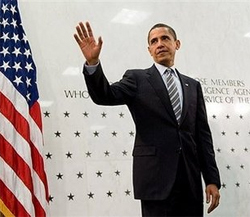Obama’s Egypt Tour: Its Historical Significance

Barack Obama's choice of Egypt for his historic address to the Muslim world carries a lot of symbolism. It coincides with the anniversary of the start of the first battle between Islam, under Prophet Muhammad, and Christendom in AD629; the 30th anniversary of Ayatollah Ruhallah Khomeini's demise and the appointment of Ali Khamenei as the new “Supreme Guide of the Islamic ummah” and more importantly, the rebuilding of the Ka'abah, the stone at the heart of Mecca, which had been destroyed in a Muslim civil war.
 |
| President Obama Photo: Courtesy |
It is on record that Africa has contributed greatly to the world’s intellectual discourse; metallurgy; writing; astronomy; navigation; medicine; architecture; agriculture and governance, amongst other fields. That the continent should fall from this height and capture the news headlines for all wrong reasons is what Obama seeks to correct by holding the important meeting in Africa.
Obama’s Egypt forum is not only an effort to re-brand Africa, but a wake up call to the continent’s leaders and elites to rise to the occasion, retrace where they lost footing and reclaim Africa’s position in global affairs.
